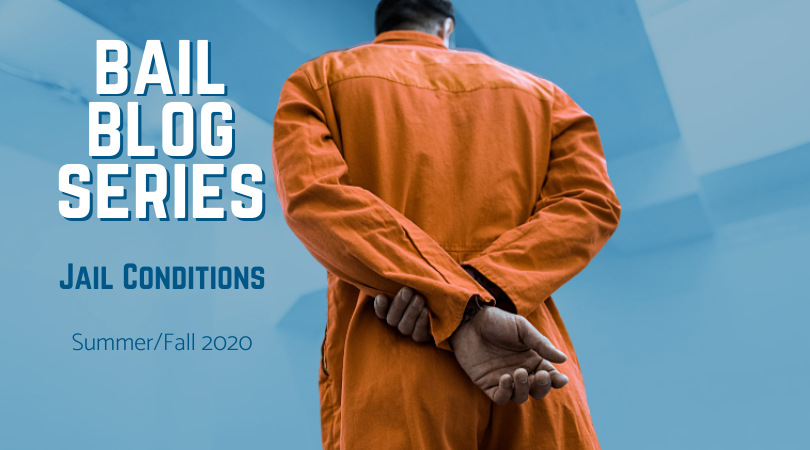Bail Blog Series: Jail Conditions

Jail isn’t a great place. But it’s not supposed to be, right? It’s a “bad” place for “bad” people. That’s okay then; jails are what they’re supposed to be.
For too many years, this embarrassingly childish way of thinking created tension between my perception of jails and the values of humane treatment. I, like many outsiders, never actively wanted jails to be terrible places. But I was certainly comfortable with their reputation as subpar, writing it off as an inherent, if deserved, part of delivering justice. I thought of jails as tucked away in isolated fields and populated with people outside of my middle-class, suburban bubble. It took me a long time to realize that “subpar” is a far cry from the horrific reality of jails and prisons in the United States—a reality that is defined to its core by overcrowding, inadequate medical care, violence, and sexual abuse.
While studying bail in Houston, I’ve found that the Harris County Jail and surrounding systems exemplify these issues. Over the past few years, Harris County Jail has been consistently non-compliant in maintaining bare minimum living standards for people housed there, with citations pointing to undercooked food, insect infestations, and multiple suicides. This, of course, only includes what state inspectors find. As Lance*, who was introduced in my last blog post, mentioned, “I’ve had it where [the auditors are] there, looking at the prison and everything. So the guards drop everybody for chow [a hot meal], and they did it for a show.… ‘Cause as soon as [the auditors] left, [the guards] racked us up for Johnny’s—two sandwiches in a bag…. Everybody thinks that when you’re there you’re doing okay. At least [they know you’re] eating. That’s bull. They don’t know what you’re eating. They don’t know that they’re really starving you in there.”
This was all before coronavirus began overwhelming jails and prisons in March, and since then conditions have only taken a turn for the worse.
***
Local news media has already extensively covered the coronavirus crisis in Harris County Jail, including the lack of cleaning equipment and PPE, the inability to follow social distancing guidelines, and the atmosphere of fear that pervades the facility. However, interviews with individuals recently released on bail offer additional insight into poor management that, alongside coronavirus, is running rampant at Harris County Jail.
We start these stories with George*, who was also introduced in my last blog post. “We were the first or second group to get quarantined. They said, ‘There’s some new stuff going on.’ So we had to go to the single-man cells for fifteen days, eating bologna sandwiches for lunch and dinner. Three times a day, bologna sandwiches. Now, we got one hot plate, but twice a day bologna sandwiches and one hot plate. It was hell. That was my experience, and I’ve been in jail many a time and I ain’t never seen it like that.”
George’s post-quarantine experience was frightening in a much different way. “I didn’t have any symptoms. On the fifteenth or the sixteenth day, they came and checked everybody’s temperature. Nobody failed, so they sent everybody to the general population. When I was in general population, I go in a tank. Everybody’s sick in there. They coughing, sore throat; they can’t smell or taste anything. So I’m looking around like, ‘Man, what they just sent me to? Everybody’s sick in here.’ And then the next day, they quarantined the tank…so they just trapped me in there with sick people.” Subjecting a human to solitary confinement can be tantamount to torture under non-pandemic conditions; forcing someone into solitary confinement to prevent them from becoming infected, only to later confine them with symptomatic inmates, is unspeakably cruel.
Jacob*, also forced into a one-man cell, faced even worse treatment. “Sometimes, we didn’t even come out for like 30, 40 hours. We’d just be locked in the cell, the one-man cell, for like 40 hours.... It’s not fair. It’s not right.”
Lance, who also spent time in the Harris County Jail during the pandemic, noted the prison administration’s creative response to inmate complaints about unsafe conditions: “They gave us a bag of chips in a Johnny Sack. And they did that because they know nobody would complain. It’s basically a measure that they took to keep peoples’ mouth shut. It’s like bribing a child with candy.”
***
Henry*, like others I interviewed, was blunt about the impacts of his inability to make bail: “It was a lot of resets in the courts due to coronavirus…. Everybody kept getting reset. I was in quarantine two times, so that’s two times I couldn’t leave to go to court.” And that points to the crux of the issue—jail conditions, especially now, endanger the health and safety of the people inside. The punishment for not having money for bail isn’t just confinement anymore; it is the risk of contracting a deadly virus through prolonged detention. George recalled a particularly bleak interaction: “I would ask people like, ‘[Is he] sick?’ and [they] would say, ‘Man, everybody’s sick in here. They’re doing us bad. They’re trying to kill us.’”
*Personally identifiable information, such as names and charges, have been altered to protect individual privacy.
This blog post is part of a series sharing first-person accounts of the bail system in Harris County. Through interviews with system-impacted people, the author explores stories of the local justice system. Read previous posts in this series here and here.



